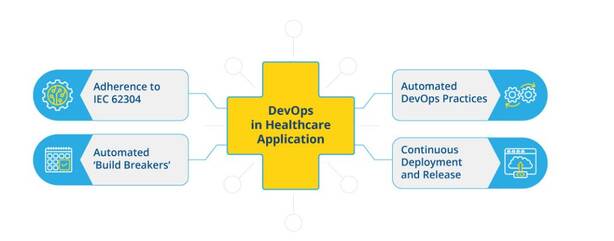Upgrade & Secure Your Future with DevOps, SRE, DevSecOps, MLOps!
We spend hours on Instagram and YouTube and waste money on coffee and fast food, but won’t spend 30 minutes a day learning skills to boost our careers.
Master in DevOps, SRE, DevSecOps & MLOps!
Learn from Guru Rajesh Kumar and double your salary in just one year.

In the rapidly evolving healthcare industry, the integration of DevOps—a collaborative approach that unifies software development (Dev) and IT operations (Ops)—is transforming the delivery of medical services. By fostering a culture of collaboration and continuous improvement, DevOps addresses the unique challenges of healthcare, including stringent regulatory requirements, the need for rapid innovation, and the imperative for high-quality patient care.
Benefits of DevOps in Healthcare
Implementing DevOps in healthcare offers several advantages:
- Enhanced Operational Efficiency: Automation of routine tasks reduces manual errors and accelerates processes, leading to more efficient healthcare delivery.
- Improved Collaboration: Breaking down silos between development and operations teams fosters better communication and teamwork, resulting in more cohesive healthcare solutions.
- Accelerated Time-to-Market: Continuous integration and delivery pipelines enable faster deployment of new features and updates, allowing healthcare providers to respond swiftly to patient needs.
- Enhanced Security and Compliance: DevOps practices incorporate security measures throughout the development lifecycle, ensuring compliance with healthcare regulations and safeguarding patient data.
Key Use Cases of DevOps in Healthcare
- Electronic Health Records (EHR) Management
- Continuous Updates: DevOps facilitates the seamless integration of updates to EHR systems, ensuring they remain current with regulatory changes and technological advancements.
- Improved Accessibility: Automated deployment processes enhance the accessibility and reliability of EHR systems for healthcare professionals.
- Telemedicine Platforms
- Rapid Development: DevOps enables the swift creation and deployment of telemedicine solutions, meeting the increasing demand for remote healthcare services.
- Scalability: Automated scaling ensures that telemedicine platforms can handle varying patient loads efficiently.
- Medical Device Integration
- Automated Testing: DevOps practices support the automation of software testing for medical devices, ensuring seamless integration and adherence to safety standards.
- Regulatory Compliance: Continuous monitoring and updates help maintain compliance with evolving healthcare regulations.
- Healthcare Mobile Applications
- Frequent Updates: DevOps enables regular updates to mobile health apps, enhancing functionality and user experience.
- Security Enhancements: Incorporating security measures throughout the development process ensures the protection of sensitive patient information.
- Clinical Decision Support Systems (CDSS)
- Real-Time Data Integration: DevOps facilitates the continuous integration of real-time data into CDSS, providing healthcare professionals with up-to-date information for patient care.
- Algorithm Updates: Automated deployment of improved algorithms enhances the accuracy and reliability of clinical decisions.

Implementing DevOps in Healthcare: Best Practices
- Adopt a Collaborative Culture: Encourage open communication and collaboration between development, operations, and clinical teams to ensure alignment with organizational goals.
- Implement Continuous Integration/Continuous Deployment (CI/CD) Pipelines: Automate the building, testing, and deployment of applications to accelerate delivery and improve quality.
- Ensure Security and Compliance: Integrate security practices into every stage of the development lifecycle to comply with healthcare regulations and protect patient data.
- Monitor Performance Continuously: Implement continuous monitoring to detect and address issues proactively, ensuring optimal performance of healthcare applications.
Challenges and Considerations
While DevOps offers significant benefits, healthcare organizations may face challenges during implementation:
- Cultural Resistance: Transitioning to a DevOps model requires a cultural shift that may encounter resistance from staff accustomed to traditional workflows.
- Regulatory Complexity: Navigating complex healthcare regulations necessitates meticulous planning to ensure compliance throughout the DevOps process.
- Security Concerns: Maintaining robust security measures is critical to protect sensitive patient data during the adoption of DevOps practices.